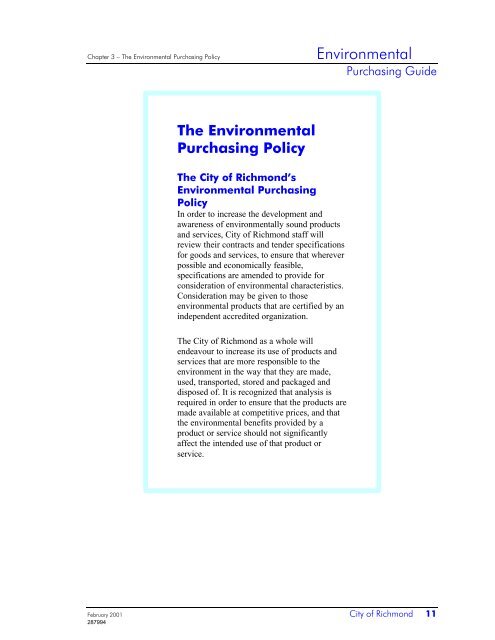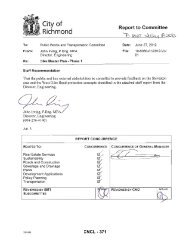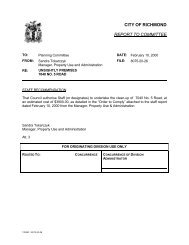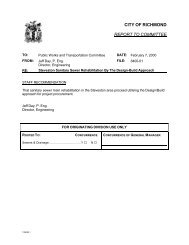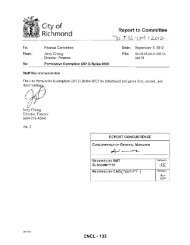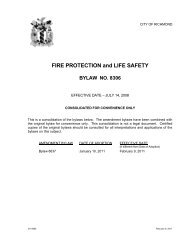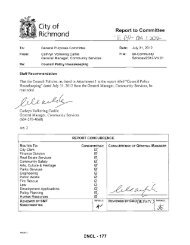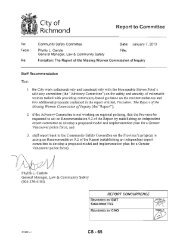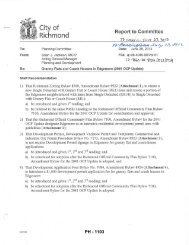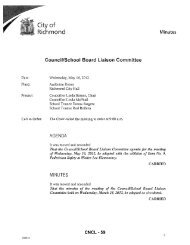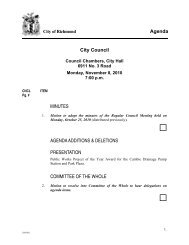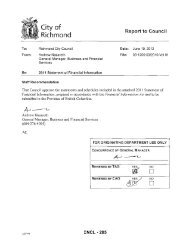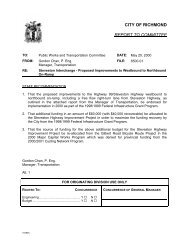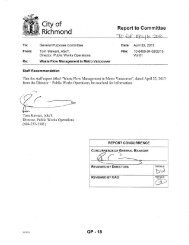The Environmental Purchasing Policy - City of Richmond
The Environmental Purchasing Policy - City of Richmond
The Environmental Purchasing Policy - City of Richmond
Create successful ePaper yourself
Turn your PDF publications into a flip-book with our unique Google optimized e-Paper software.
Chapter 3 – <strong>The</strong> <strong>Environmental</strong> <strong>Purchasing</strong> <strong>Policy</strong><br />
<strong>Environmental</strong><br />
<strong>Purchasing</strong> Guide<br />
<strong>The</strong> <strong>Environmental</strong><br />
<strong>Purchasing</strong> <strong>Policy</strong><br />
<strong>The</strong> <strong>City</strong> <strong>of</strong> <strong>Richmond</strong>’s<br />
<strong>Environmental</strong> <strong>Purchasing</strong><br />
<strong>Policy</strong><br />
In order to increase the development and<br />
awareness <strong>of</strong> environmentally sound products<br />
and services, <strong>City</strong> <strong>of</strong> <strong>Richmond</strong> staff will<br />
review their contracts and tender specifications<br />
for goods and services, to ensure that wherever<br />
possible and economically feasible,<br />
specifications are amended to provide for<br />
consideration <strong>of</strong> environmental characteristics.<br />
Consideration may be given to those<br />
environmental products that are certified by an<br />
independent accredited organization.<br />
<strong>The</strong> <strong>City</strong> <strong>of</strong> <strong>Richmond</strong> as a whole will<br />
endeavour to increase its use <strong>of</strong> products and<br />
services that are more responsible to the<br />
environment in the way that they are made,<br />
used, transported, stored and packaged and<br />
disposed <strong>of</strong>. It is recognized that analysis is<br />
required in order to ensure that the products are<br />
made available at competitive prices, and that<br />
the environmental benefits provided by a<br />
product or service should not significantly<br />
affect the intended use <strong>of</strong> that product or<br />
service.<br />
February 2001 <strong>City</strong> <strong>of</strong> <strong>Richmond</strong> 11<br />
287994
<strong>Environmental</strong><br />
<strong>Purchasing</strong> Guide<br />
In Plain English<br />
Like every good news story, the policy<br />
addresses the questions <strong>of</strong> who, what,<br />
where, when and why.<br />
Who should implement this policy?<br />
<strong>The</strong> short answer is “everyone”!<br />
What actions should be undertaken?<br />
<strong>City</strong> staff are asked, “wherever possible and<br />
economically feasible”, to consider the<br />
environmental characteristics <strong>of</strong> goods and<br />
services they may purchase or recommend<br />
for purchase. This includes reviewing<br />
contracts and tender specifications and<br />
revising them to reflect environmental<br />
considerations as appropriate.<br />
Where does this policy apply?<br />
Again, the short answer is “everywhere!”<br />
Staff are asked to add environmental<br />
considerations to the way they judge every<br />
product or service. That means looking at<br />
the way a product is made, used,<br />
transported, stored, packaged and disposed<br />
<strong>of</strong>.<br />
<strong>The</strong> policy recognizes that environmental<br />
criteria are only one way in which staff will<br />
judge a product or service. Analysis is<br />
needed in order to ensure that<br />
environmentally responsible products are<br />
made available at competitive prices, and<br />
that the environmental benefits provided by<br />
a product or service do not undermine the<br />
overall performance.<br />
When does this policy take effect?<br />
Now.<br />
Why establish a policy?<br />
An environmental policy is established “in<br />
order to increase the development and<br />
awareness <strong>of</strong> environmentally sound<br />
products and services.” <strong>Environmental</strong>ly<br />
preferable products are <strong>of</strong>ten better, serve<br />
Chapter 3 – <strong>The</strong> <strong>Environmental</strong> <strong>Purchasing</strong> <strong>Policy</strong><br />
longer, save money over the long-term and<br />
become less expensive after widespread<br />
acceptance. <strong>The</strong> desired outcome is that the<br />
whole organization strives to increase the<br />
use <strong>of</strong> products and services that are more<br />
responsible to the environment.<br />
A Little Background<br />
<strong>The</strong> <strong>City</strong> <strong>of</strong> <strong>Richmond</strong> <strong>Environmental</strong><br />
<strong>Purchasing</strong> <strong>Policy</strong> is modelled after the<br />
groundbreaking Statement <strong>of</strong> Principle<br />
advocated by the Association <strong>of</strong> Canadian<br />
Cities for <strong>Environmental</strong>ly Sound Strategies<br />
(ACCESS).<br />
When ACCESS members — senior<br />
procurement <strong>of</strong>ficials representing major<br />
urban areas across Canada — first met in<br />
1989 there were limited, almost non-existent<br />
sources and supplies <strong>of</strong> recycled content<br />
products. Members felt that, in order to<br />
ensure the continued success <strong>of</strong> waste<br />
reduction and recycling programs, sound<br />
procurement policies were needed. <strong>The</strong><br />
Statement <strong>of</strong> Principle, now endorsed and/or<br />
adopted by over fifty Canadian<br />
municipalities, was seen as the starting point<br />
toward the development <strong>of</strong> environmentally<br />
sound purchasing strategies.<br />
ACCESS’s approach has proven to be<br />
sound. In the last decade the availability <strong>of</strong><br />
recycled products has increased<br />
significantly. <strong>The</strong> price gap between<br />
recycled products and standard stock have<br />
narrowed dramatically, and in a number <strong>of</strong><br />
cases the prices for recycled products are at<br />
par or lower than prices for standard stock.<br />
Market conditions and factors <strong>of</strong> supply and<br />
demand, not artificial price preferences or<br />
premiums, have largely determined pricing.<br />
For a closer look at how ACCESS has<br />
revised its “Statement <strong>of</strong> Principle” over the<br />
last decade, please see “Evolution <strong>of</strong><br />
<strong>Environmental</strong> Procurement Policies”,<br />
Appendix A.<br />
12 <strong>City</strong> <strong>of</strong> <strong>Richmond</strong> February 2001<br />
287994


